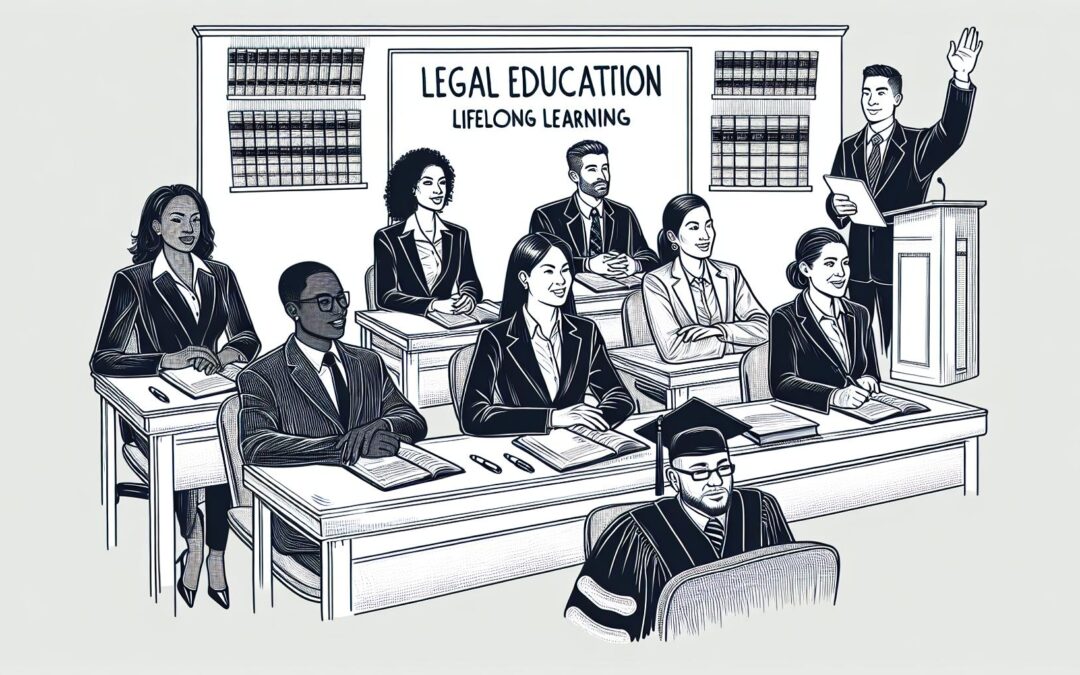The Patent Bar Exam is an important milestone for individuals looking to become a registered patent attorney or agent. Before diving into the extensive preparations required for this exam, it is crucial to understand the fee structure associated with it. In this article, we will explore the various fees, break them down, and discuss how to financially prepare for the Patent Bar Exam.
What is the Patent Bar Exam?
The Patent Bar Exam, officially known as the United States Patent and Trademark Office (USPTO) Registration Examination, is a comprehensive test that assesses the knowledge and skills necessary to practice patent law before the USPTO. Passing this exam is a prerequisite for becoming a registered patent attorney or agent.
Aspiring patent professionals spend countless hours studying and preparing for this challenging exam, which consists of multiple-choice questions covering various aspects of patent law, rules, and procedures.
Importance of the Patent Bar Exam
The Patent Bar Exam is a crucial step towards a successful career in patent law. By passing this exam, individuals demonstrate their expertise in understanding and applying the complex regulations governing patents. It serves as a gateway to practicing before the USPTO, representing clients in patent-related matters, and safeguarding their intellectual property rights.
Furthermore, the Patent Bar Exam is not just a test of knowledge, but also a test of analytical and critical thinking skills. It requires individuals to analyze complex legal scenarios and apply their understanding of patent law to arrive at the best possible solutions for their clients.
Additionally, passing the Patent Bar Exam is a mark of credibility and competence in the field of patent law. It showcases an individual’s dedication and commitment to their profession, as well as their ability to navigate the intricacies of patent law.
Who Should Take the Patent Bar Exam?
The Patent Bar Exam is primarily intended for individuals seeking to become patent attorneys or agents. Although there are no specific educational requirements to take this exam, most individuals who pursue it have a technical or scientific background.
Engineers, scientists, and individuals with expertise in fields such as biotechnology, chemistry, electronics, and software engineering often choose to take the Patent Bar Exam to enhance their career prospects and unlock new opportunities in the field of patent law.
Moreover, the Patent Bar Exam is not limited to individuals with a technical background. It can also be a valuable credential for individuals with a legal background who wish to specialize in patent law. By taking and passing the exam, these individuals can expand their practice areas and offer comprehensive legal services to clients seeking patent protection.
Furthermore, the Patent Bar Exam can be a stepping stone for individuals who aspire to work in the USPTO. Many professionals in the field of patent law start their careers as patent examiners, responsible for reviewing patent applications and determining their patentability. By passing the Patent Bar Exam, individuals can demonstrate their knowledge and understanding of patent law, making them attractive candidates for examiner positions.
In conclusion, the Patent Bar Exam is a rigorous and important examination that opens doors to a rewarding career in patent law. It tests individuals’ knowledge, analytical skills, and ability to apply patent law principles to real-world scenarios. Whether one has a technical or legal background, passing this exam can lead to exciting opportunities in patent law practice or within the USPTO itself.
Breakdown of the Patent Bar Exam Fee Structure
The fee structure for the Patent Bar Exam consists of three main components: registration fees, examination fees, and miscellaneous fees.
Before scheduling an exam date, aspiring candidates are required to pay a non-refundable registration fee. This fee covers the administrative costs associated with processing and maintaining candidate records.
The registration fee for the Patent Bar Exam is subject to change, so it is advisable to check the USPTO website for the most up-to-date information regarding fee amounts.
Once registered, candidates must pay the examination fee, which covers the cost of taking the actual exam. The examination fee is typically higher than the registration fee and is non-refundable.
Similar to the registration fee, it is important to verify the current examination fee on the USPTO website before submitting your payment.
In addition to the registration and examination fees, there may be other miscellaneous fees associated with the Patent Bar Exam. These fees can include charges for rescheduling the exam or requesting score reports.
It is recommended to review the USPTO’s current fee schedule to familiarize yourself with these miscellaneous fees and plan accordingly.
When considering the breakdown of the Patent Bar Exam fee structure, it is essential to understand the reasoning behind these fees. The registration fee covers the initial administrative tasks involved in processing the candidate’s application and creating a record for them. This includes verifying the candidate’s eligibility and ensuring that all necessary documentation is in order.
The examination fee, on the other hand, is intended to cover the costs associated with administering the actual exam. This includes the development and maintenance of the exam content, as well as the resources and personnel required to proctor and grade the exam. The higher examination fee reflects the comprehensive nature of the exam and the resources needed to ensure its integrity and accuracy.
Aside from the registration and examination fees, there are miscellaneous fees that candidates should be aware of. These fees are typically associated with specific actions or requests made by the candidates. For example, if a candidate needs to reschedule their exam date, there may be a fee associated with that request. Similarly, if a candidate wants to request score reports or additional documentation, there may be charges for those services.
Understanding the fee structure of the Patent Bar Exam is crucial for candidates to plan their finances accordingly. It is important to budget not only for the registration and examination fees but also for any potential miscellaneous fees that may arise during the exam process. By familiarizing themselves with the current fee schedule and being aware of any potential changes, candidates can ensure that they are fully prepared to meet the financial obligations associated with the Patent Bar Exam.
How to Prepare Financially for the Patent Bar Exam
Preparing for the financial aspects of the Patent Bar Exam can significantly alleviate stress and ensure a smooth exam experience. Here are some strategies to help you financially prepare:
When it comes to preparing for the Patent Bar Exam, it’s important to consider not only the time and effort you’ll need to invest in studying, but also the financial aspect. By planning ahead and implementing effective financial strategies, you can navigate this process with ease and confidence.
Saving Strategies
Start saving for the exam well in advance. Allocate a portion of your monthly income to a dedicated savings account to build a fund specifically for the Patent Bar Exam. By setting aside money regularly, you can gradually accumulate the necessary funds without straining your finances.
Consider creating a budget to track your expenses and identify areas where you can cut back. Small adjustments, such as reducing dining out or entertainment expenses, can add up over time and contribute to your exam fund. Temporary sacrifices can lead to long-term benefits as you invest in your career.
Furthermore, explore ways to earn extra income during your study period. This could include taking on freelance work, tutoring, or participating in paid research studies. By diversifying your income sources, you can accelerate your savings and reach your financial goals faster.
Financial Aid and Scholarships
While saving is essential, it’s also worth exploring financial aid options that may be available to support your Patent Bar Exam journey. Some organizations offer grants or scholarships specifically for individuals pursuing careers in patent law. Research and apply for these opportunities to help offset the exam costs.
Additionally, check with your employer or educational institution to see if they offer reimbursement programs for professional development exams. Many companies and universities have policies in place to support employees or students seeking to further their education and career advancement. Taking advantage of these benefits can significantly reduce your out-of-pocket expenses.
Moreover, consider reaching out to professional organizations or associations related to patent law. They may have resources or information on financial assistance programs that can help alleviate the financial burden of the exam. Networking with professionals in the field can also provide valuable insights and potential opportunities for financial support.
Lastly, don’t overlook the potential tax benefits associated with exam expenses. Consult with a tax professional to understand if you qualify for any deductions or credits related to the Patent Bar Exam. Taking advantage of these tax benefits can further ease the financial strain.
Preparing financially for the Patent Bar Exam is a crucial step in ensuring a smooth and successful journey. By implementing saving strategies, exploring financial aid options, and considering potential tax benefits, you can alleviate financial stress and focus on your exam preparation with confidence.
Additional Costs Associated with the Patent Bar Exam
Aside from the registration, examination, and miscellaneous fees, candidates should be aware of additional costs that may arise during the preparation and exam process.
Study Materials and Prep Courses
To increase their chances of success, many candidates invest in study materials and preparation courses. These resources can include textbooks, online courses, practice exams, and study guides. It’s essential to budget for these materials as they can contribute to a comprehensive and effective study plan.
Travel and Accommodation Expenses
If you are planning to take the exam at a designated test center, consider the potential travel and accommodation costs. Research nearby lodging options and transportation arrangements to estimate the associated expenses accurately. Planning ahead and securing affordable options can help minimize these expenditures.
However, in recent times, due to the COVID-19 pandemic, the USPTO has introduced remote proctoring options, reducing the need for travel in some cases. Check the USPTO website for the most up-to-date information on exam format and delivery methods.
Understanding the Refund and Rescheduling Policies
Life can be unpredictable, and circumstances may arise that require rescheduling or canceling your exam. Familiarize yourself with the refund and rescheduling policies to avoid potential financial inconveniences.
How to Reschedule Your Exam
If you need to reschedule your exam date, be aware that there may be rescheduling fees associated with changing your appointment. Familiarize yourself with the process outlined by the USPTO and plan ahead to avoid any last-minute surprises.
Be mindful that rescheduling options may have specific deadlines. Therefore, it is crucial to familiarize yourself with the policies and act accordingly to avoid unnecessary expenses.
Refund Policies and Procedures
In the event that you need to cancel or withdraw your exam registration, the refund policies and procedures outlined by the USPTO will govern the reimbursement process. It is crucial to understand these policies to determine the eligibility for a partial or full refund of your fees.
Make sure to communicate with the USPTO promptly and adhere to their guidelines to facilitate a smooth refund process.
In conclusion, understanding the fee structure associated with the Patent Bar Exam is essential for proper financial planning. By familiarizing yourself with the various fees, preparing financially, and being aware of additional costs and refund policies, you can confidently navigate the financial aspects of this significant milestone on your path to becoming a registered patent attorney or agent.











